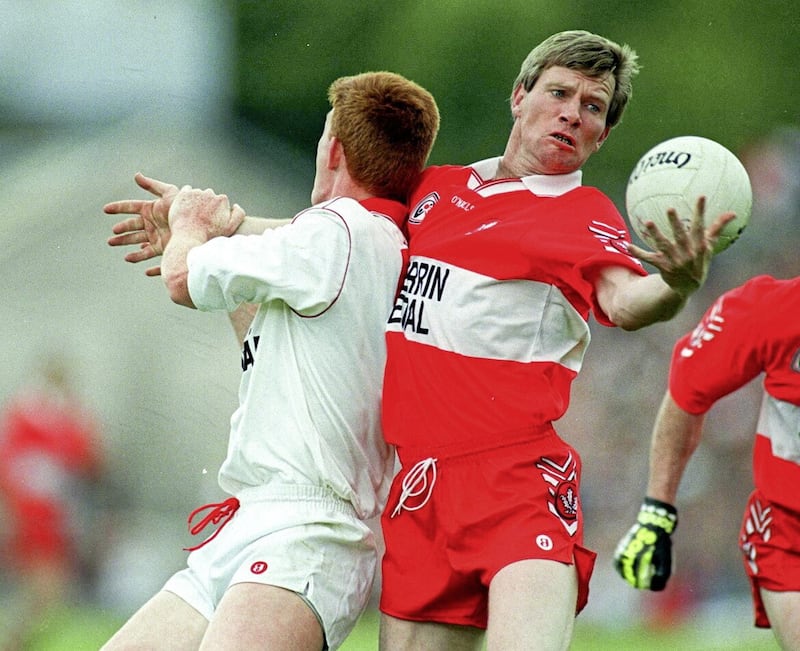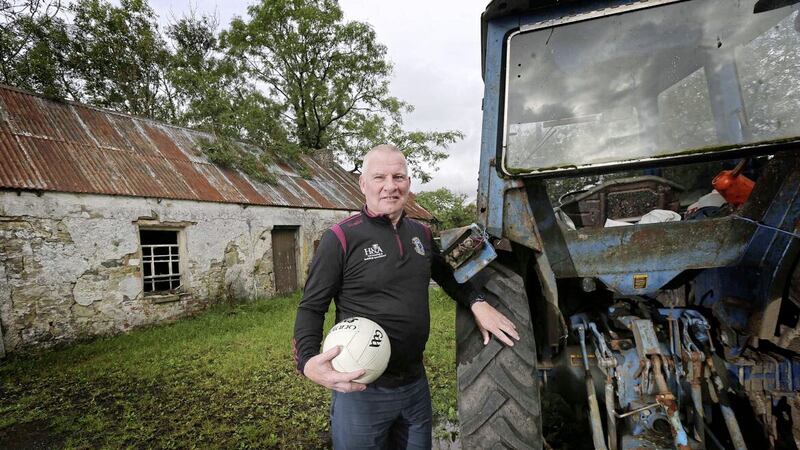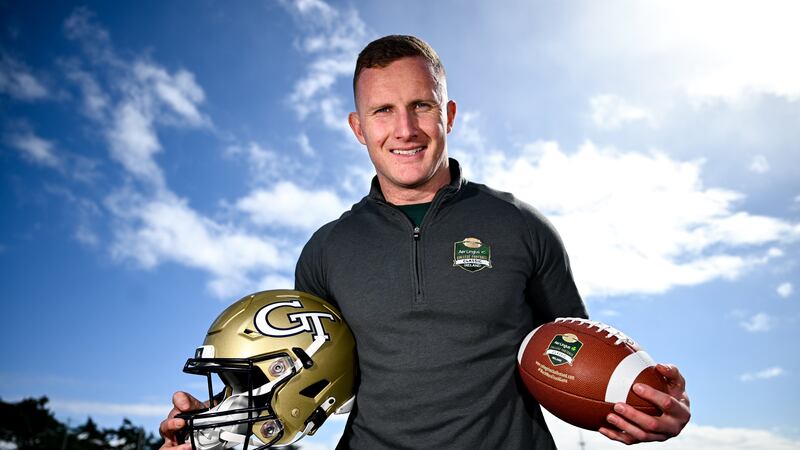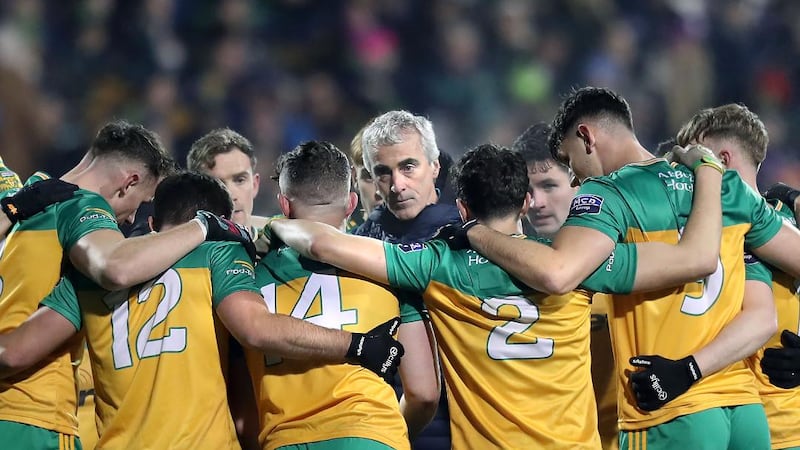TWO, maybe three times a week they’d gather in Groogan’s field to play soccer.
It was a mile if they took the road, or two field lengths the short way.
A dozen cars abandoned at its entrance, nothing fit to get past them, two dozen footballers navigated the uneven, sloping terrain below with its handmade goals.
John Scullion got ‘Red Pele’.
Joe Kerr, who played in his bare feet, was ‘Lato’ after the famous Polish winger.
And Tony Scullion was The Moocher, Groogan’s field’s answer to Erling Haaland.
“It never seemed to get dark in those times,” Tony smiles.
When they were done, they’d walk to Kerr’s corner and a group of them would sit there for another hour, just talking. They mightn’t hit the beds until well past midnight.
To understand Tony Scullion, you have to understand his relationship with the place he comes from.
For one, as for all of its nationalist inhabitants, it is Ballinascreen, not Draperstown.
The town’s name is one of the north’s uniquely ingrained bones of contention, having been changed in 1818 by the Drapers’ Company, who were English settlers. The name Ballinascreen remains attached to its outlying rural parts and to the GAA club.
He’s lived in the town since he and Siobhan got married in 1991. No difference in his mind.
The Scullions were three brothers. Danny the eldest, who took into a life of GAA administration. John in the middle, an ardent supporter of club and county, albeit not to the same extent since he lost his late travelling companion Hugh McWilliams.
And Tony, the youngest, turned 60 this year.
22 Carnamoney Lane, out where grass grows up the middle of the road, was a world his own children now could barely comprehend, albeit Ciara and Anton have hinted they want to end up back there.
His father farmed the 30-odd acres of land they owned between there and his homeplace in Lisnamuck.
They kept a dozen-or-so suckler cows and sold the calves, and few sows for a while too. They cut turf and hay and lived off what little the land offered. There was no running water when they were children and electricity only came as Tony was starting big school.
All they owned in the world was an old Dexta tractor – “it was supposed to be blue but there was more rust on it than blue!” – and a bicycle.
The conversation has been winding through the hills and valleys of his life for nearly two hours. It starts with the mix of joy and isolation and innocence of life on the farm, and that’s where it ends back.
“I’m an ordinary three-eighths of a person, we all are, none of us is perfect,” he says.
“I believe everyone has to be treated fairly in life, no matter what you have, who you are, what you own, where you come from.
“Where I grew up at, I could have very easily hid in the rushes and not come out of it. I’d say for manys a year I did, hid in the rushes. Felt inferior to people because of where I come from. No doubt about it. We had nothing and I felt inferior, yes, I did.”
That manifested itself at secondary school.
“I felt inferior to people and felt I wasn’t respected like other pupils. That wasn’t with all teachers, absolutely not.”
The idea that Tony Scullion would be made feel inferior is almost hard to comprehend.
In Derry’s history, only Anthony Tohill can match his four Allstars.
Scullion played in two International Rules series’ for Ireland, won six Railway Cups in-a-row with Ulster.
Atop the dresser that stands high in the corner sit the Allstars. They’re the only memorabilia not in the roofspace. There’s a fifth piece of metal too – a colleges camogie Allstar won by their daughter Charlene.
It’s her birthday the day we meet. Not just that, but the anniversary of the moment that he’s always felt the whole pursuit was about.
It’s the story he tells the most, of taking Sam Maguire down the lane after her christening and placing it on his father’s knee, seeing the tearful smile break across his face.
John Scullion senior farmed the land but took bad arthritis and was housebound on crutches for years before he passed away.
Tony’s childhood memories of him when he was well are of going the four miles on the bike to Dean McGlinchey Park, the old county grounds, to watch Derry playing as a boy.
They lived for gathering around the wireless and listening to Michéal Ó hÉihir calling All-Ireland semi-finals and finals.
John never once saw his son play for Derry or Ballinascreen. When the All-Ireland final came in ’93, he couldn’t bear to watch it. He sat in the bedroom with his rosary beads, praying and relying on Maire to come down with updates from the kitchen where she watched and prayed too.
When his father wasn’t fit to farm, Maire (pronounced Mara) took over a lot of it.
“My mother would have outworked any two farming men. She’d embarrass you with work,” he says.
“I know what they done for us. They went through a hard time. They had nothing and they reared us, and d’ye know this, we got everything we wanted.
“When you look back now, just a locka cattle and pigs, how did they rear us? That was it. There wasn’t much money.
“They could very easy have stopped me from doing what I loved but they never, ever did. Hay had to be saved and turf taken home and manys an outhouse had to be read out and animals had to be fed – but if I had football or hurling to go to, I got.”
Up on the wall at his back is a suited portrait of himself holding the Sam Maguire Cup that same day of the christening.
They were living on High Street at the time. Just as in Carnamoney, where it was the Thompsons, their neighbours were Protestant people, the Earleys.
“They’d a lovely wee garden at the back of the house. We asked Bill Earley if we could use it for a few photos. The Earley family got a photo taken with the cup themselves and had it up in their house for the rest of their days.”
Charlene was born on September 5, 1993. Kilkenny and Galway were slugging it out in the All-Ireland hurling final on TV, but eventually he had to abandon it and take Siobhan to Mid-Ulster Hospital.
Two weeks to the day later, Derry were All-Ireland champions with the new father at full-back. He’d started on John O’Driscoll but the harshest of red cards for Tony Davis meant a half-time reshuffle. Colin Corkery came in for the second half and Eamonn Coleman told Scullion to stay put. It went a long way.
Yet it almost didn’t happen. A broken ankle towards the end of the league was the only serious injury of his career, but it threatened to ruin a summer that could have been very different for Derry without him.
He played county football from 1983 until 1996. Still he wonders if Brian Mullins hadn’t come back to take the phone call early in ’97 to say he wasn’t coming back, was there another Ulster title there? Watching Damien O’Reilly palm the ball down for Jason Reilly’s decisive goal, he can’t help but wonder if marking his friend O’Reilly would have suited him.
“But it might not have worked for me in ’97. I had a good run and nobody had to tell me to go.”
From the Groogans began lifting him to take them to games, he quickly became hooked.
He was no age when the whole family was invited to his godmother’s wedding. Tony agreed he’d go on the condition he got home in time for Ballinascreen’s U14 match that evening. His parents went along with it assuming he’d forget about it when he got there.
“Well I started a rumpus at the wedding. Rared up and said I had to get home. I’m sure Mammy was embarrassed at me, completely. Started a wile fluster in the wedding when the music was on, I tortured Mammy. That’s what it meant to me, I couldn’t miss the match.”
You can hear it in his voice that not being offered a trial for Derry minors still hurts a bit, and it was his last year of U21 by the time he felt the Oak Leaf by his heart. It hasn’t left since.
“I’d say the GAA brought the best out of me. No doubt about it. It’s a good question you asked earlier – where would I have been at if I hadn’t had the GAA?
“It brought the best out of me because I was fit to go out on the green grass and prove myself to that person who maybe felt they were better than us.”
____________________________________________
HE stands tall, the waistband of his O’Neills bottoms turned out. On a safety pin hang four miraculous medals.
They’re only worn sporadically now. He’d put them on last Monday morning for this interview – “because you were coming and that the man would guide me, that the thing would go well” – but mostly it’s just when he’s along the line with teams now.
Tony Scullion’s been involved with Ballinascreen teams since he quit playing, taking every age from top to bottom. At the minute it’s the under-15s.
Every time he ever played for club and county those miraculous medals were pinned inside his shorts and he carried a prayer to St Joseph in his boot. You ask him to recite it. He stares out the living room window, away, and rattles it off so fast the microphone can barely detect a word.
“I’m no holy Joe. I’m not! Useless in prayer. But I’ve an odd wee prayer, my own wee beliefs. I’m not the same person I was growing up, I’m not as religious as I was possibly, but I have a wee bit of faith.”
That was another product of being brought up in rural Ireland in the 1960s and 70s. Everyone just went to mass. He took his mother regularly to the monks in Portglenone.
Home has always been where he’s felt safest. He and Siobhan considered building out at the homestead on Carnamoney Lane but with Ciara and Anton added to the family, they instead settled in the town.
Part of him loves the quiet and part of him feels the art of human interaction is more dead than it is dying.
After years as a labourer for Heron’s during his playing days, he moved across for a year as a window salesman for a different branch of the same company. There were two men from Glack, a small club outside Limavady, that loved to see him coming, Roger McLaughlin and Joe O’Connor.
“They’d have every window measured for me, I hadn’t to take the measuring tape out of my pocket. They had the work done for me, and when I got to their wee huts, I went in and set and drunk tae and ate buns and talked football all day.”
And perhaps if anything sums up Tony Scullion, it’s that job. He left it after a year because he couldn’t live with promising windows to customers within weeks and not deliver them for months. He had nothing to go to but left anyway.

As it turned out, so began a career in coaching. He travailed the schools of Derry for a decade before moving up in Ulster Council. He still works for them yet, albeit less hands-on.
The coaching is the bit he’s always loved. Being asked to help out by Damian Barton when he became Derry manager was an honour but his role was away from the training ground and that did frustrate him.
“I knew what my role would be because Damian had explained it very well. I’d be an eye in the stand and giving them my opinion. That was my role, I was delighted to do it, but I’d have loved to have been more hands on.
“Was it fulfilling to me? Not really, let’s be honest. I had no hands-on, but I knew that.”
Opportunities have come up to go to Australia and England and various places but he turns them down. He loved it when he was playing, first man on the plane for the International Rules tour, but that was to play.
On the way home once from a hurling game down south, he and three team-mates were stopped at the checkpoint in Aughnacloy. Torn from the car, put in separate corners of the big shed and interrogated.
He’s unsure of the date but very sure of the impact. When the Ulster-based players afterwards trained at St Macartan’s College for the 1990 International Rules series – a couple of years after Aidan McAnespie was shot dead at the same crossing – he wouldn’t go alone.
“We weren’t married at the time but Siobhan raced home from work and I’d have took her in the car. I didn’t want to cross that Aughnacloy crossing again at 11 or half 11 at night myself. That experience of that shed, it scarred me.
“Them was terrible times. Taking a GAA bag in a car… It wasn’t right how we were treated. It wasn’t right how our community was treated. Thrown out of cars, bags searched, held up for training sessions – it was absolutely terrible what they got away with.”
He's Irish in his beliefs but bothers nobody with them. The Thompsons were the neighbours at home and, as is the farming way, the two families worked hand-in-hand at the land. They had more machinery and would bail the hay for the Scullions, who were always fit to lend themselves the other way.
“When they were digging the spuds, we helped them do the gathering.”
Tony turned 60 in February and it’s been a rough enough year. Covid-19 wasn’t too sore on him but soon after contracting it, he suffered a mini-stroke.
That was followed by burst ulcers – “worst of the lot” – which left him up vomiting blood in the middle of the night, an ambulance needed to take him to Antrim Area Hospital where he spent a week.
“I’m picking up now but I don’t have the same energy. I could sleep more, I’m tired, but I’m still going.”
There’s plenty left in him and whatever time he has, he’ll appreciate.
Talk comes around to missing out on a county medal with his club. He played in three Derry football finals and five hurling deciders, and lost them all. A hurling decider in ‘89 saw them lose to a last-minute goal to Kevin Lynch’s having played almost the entire game with 14 men.
In 1994, Eamonn Burns went to America for the summer and Tony Scullion moved to full-forward. He kicked scores for fun. When Burns came home for the semi-final they paired up and helped hammer Ballinderry, but they didn’t show at all in the final and were beaten by Bellaghy, who ended up in the All-Ireland club final off the back of it.
In a recent Off The Ball roadshow, Enda Gormley said if Derry hadn’t needed him in the full-back line, Scullion would have won Allstars in the half-forward line.
But more than the sporting aspect, it always comes back to people. He remembers Matt Bradley, midfield on the team beaten by Lavey in the 1990 decider (after which they’d win the All-Ireland), barely able to pull on his tracksuit when they got back to the decider two years later. By then he was very ill with cancer, but togged out and got through the pre-match ritual. Matt died in March 1993, at the tender age of 30.
And Mickey McGlone too, who played in ’90 final and was manager in ’92, how he and his wife Fidelma never left the club, tending to all the odd jobs.
The GAA was Tony Scullion’s door to life. It brought him out of the rushes, and allowed him to learn and show that he wasn’t one bit inferior to any man.
He always held that door open behind him, never closed it in anyone’s face.
Maybe that says more than anything.








